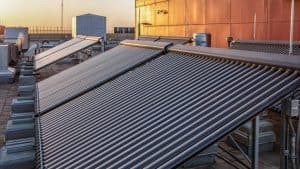
In August, the Bureau of Overseas Buildings Operations (OBO) installed its first ever large-scale renewable battery energy storage system at the new U.S. Embassy in Niger. The installation enhances the campus’s energy efficiency by maximizing the storage and use of solar power and marks a crucial step in the Department of State’s efforts to advance sustainability and resilience at diplomatic posts overseas.
The new batteries store, abundantly, available solar energy, complementing the embassy’s current 750kW photovoltaic (PV) system and ensuring that enough power is supplied during peak sun hours to operate the building and eliminate the embassy’s reliance on generators or the local grid. Embassy Niamey has historically suffered from power interruptions due to unreliable utility supply, including frequency and voltage fluctuations. These disruptions have negatively impacted operations and caused the embassy to primarily rely on diesel generators, which required regular maintenance and depended on a supply of diesel fuel that was costly and not always available.
The newly installed battery containers maintain a capacity of 1.5MWh and assuage the embassy’s dependence on diesel fuel, allowing the facility to power the site primarily with a clean, renewable power supply.
The power control system is intelligent and continuously calculates the batteries’ charging and discharging, and monitors utility and generator contributions. The embassy can now operate at full load with lower utility demands, saving direct power and reducing demand charges by modulating the battery and solar output and ensuring a smooth transition among power sources when clouds impact PV power generation.
The installation was completed with the help of the embassy contractor B.L. Harbert International, their sub-contractor for electrical engineering, RME Electric, and Solar Design Associates. After the successful installation of renewables in Koror, Palau, galvanizing the first net-zero energy embassy, OBO is poised to leverage this new technology to support more locations with green battery storage and renewable energy operations.
